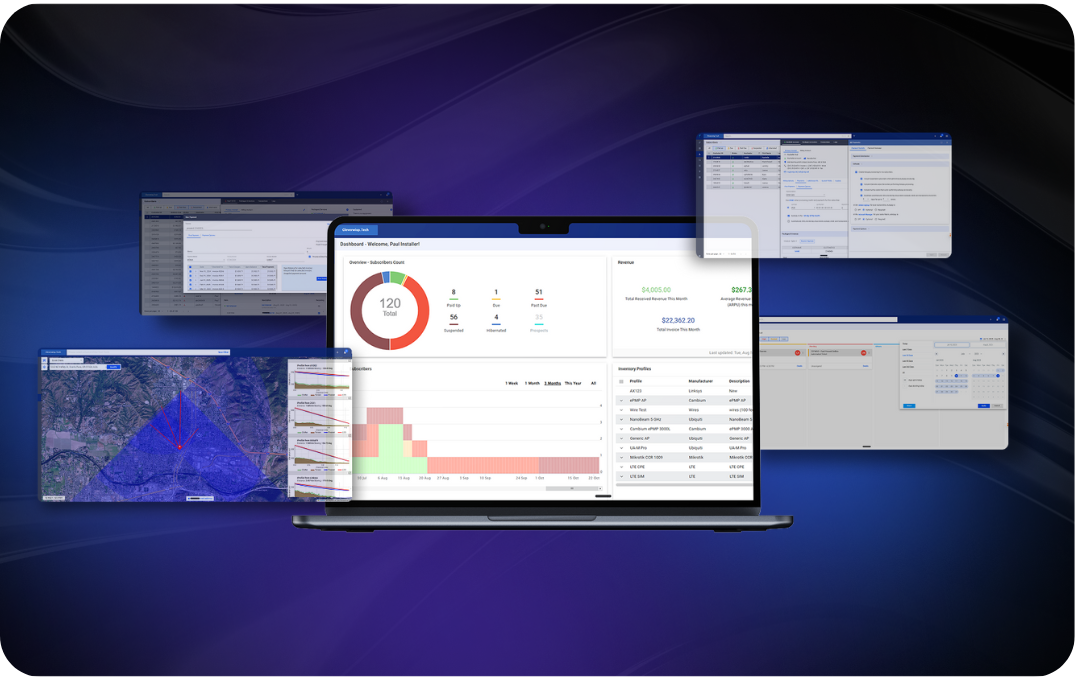Why MDUs Are One of the Biggest Growth Opportunities for ISPs
Multi-Dwelling Units (MDUs)—including apartment complexes, condominiums, student housing, and senior living communities—are no longer a niche market. They’re a prime opportunity for Internet Service Providers (ISPs) to scale faster and achieve stronger returns on infrastructure investments.
According to Broadband Communities, 552,000 MDU units were permitted in 2021, with projections for 500,000 more in 2022 despite broader housing slowdowns. In many top U.S. metro areas, MDUs now account for up to 40% of all new housing. Nearly all of these developments are designed with fiber-readiness in mind, which drastically reduces per-unit deployment costs.
For ISPs, this means a chance to capture dozens—or even hundreds—of subscribers with a single network build. Instead of chasing scattered single-family homes, you can secure large customer clusters under one agreement, reducing acquisition costs and increasing lifetime customer value.
The Strategic Advantage of Targeting MDUs
Higher Subscriber Density per Deployment
A single fiber run to an MDU can connect dozens or hundreds of units, meaning your cost per connected subscriber drops dramatically compared to suburban or rural builds.
Streamlined Sales and Onboarding
Instead of marketing to individual households, you negotiate once with a property owner or HOA and gain access to every tenant. That’s fewer sales cycles and faster activation timelines.
Long-Term Retention Potential
Bulk service agreements often run multiple years, locking in revenue and minimizing churn. Even when tenants move, the building stays connected—so new residents become instant prospects.
Common ISP Challenges in the MDU Market
The upside is significant, but MDUs bring unique operational hurdles:
Managing Multiple Properties Efficiently
Without centralized CRM and billing automation, supporting hundreds of units across multiple properties can quickly overwhelm internal teams.
Handling Different Ownership Structures
An MDU might have a single owner, a property management company, or an HOA board—each requiring a different approach to contracts, billing, and support.
Supporting Multiple Brands or Resellers
For ISPs that have acquired multiple networks or support reseller partners, it’s critical to maintain brand separation and customer data integrity while keeping backend processes unified.
Real-World Workflow – Onboarding a New MDU
Here’s how many successful ISPs approach the MDU onboarding process:
- Identify the Opportunity – Use local permit filings, developer announcements, and broadband construction reports to find buildings in pre-construction or renovation phases.
- Engage Property Decision-Makers – Offer a proposal that highlights revenue predictability, increased property value, and reduced tenant turnover.
- Site Assessment – Check existing wiring, determine fiber entry points, and evaluate where to place network equipment.
- Proposal & Agreement – Present per-door pricing and tiered packages. For rentals, negotiate exclusivity or “preferred provider” status.
- Infrastructure Deployment – Install fiber to the building (FTTB) or to individual units (FTTH), complete in-building wiring, and configure authentication systems.
- Tenant Onboarding – Provide a self-service portal for account setup, payments, and upgrades. Run in-building promotions to encourage sign-ups.
- Ongoing Support & Upselling – Automate service notifications, push seasonal upgrade offers, and track retention metrics.
Technology Considerations for MDUs
In-Building Wiring
For older MDUs, rewiring may be necessary. In new builds, partner early with developers to ensure fiber-friendly designs and equipment rooms with proper ventilation and power.
Wi-Fi Coverage
Dense living environments create interference challenges. Managed Wi-Fi with private SSIDs for each tenant ensures security and better performance.
Authentication & Access Control
Systems like RADIUS authentication or magic-link logins simplify secure access, cut down on password-related support tickets, and improve subscriber onboarding speed.
Monitoring & Maintenance
Deploy network monitoring that alerts your team to outages before tenants notice. Proactive fixes boost customer satisfaction and reduce churn.
The Role of CRM in Scaling MDU Operations
Multi-Brand Setup
If you operate multiple ISP brands:
- Switch between brands in a single CRM interface.
- Keep each brand’s customer data, billing rules, and branding separate.
- Assign user roles with brand-specific access.
- Aggregate reporting for executive oversight.
Learn more about multi-brand vs. reseller CRM setups
Reseller Setup
If you wholesale your network to resellers:
- Each reseller gets their own CRM instance with full autonomy.
- Your visibility into their customers is limited by design.
- You can bill based on their subscriber count, creating a scalable revenue model.
Operational Tips for ISPs Expanding into MDUs
- Standardize Installations – Develop a repeatable checklist for property access, equipment setup, and tenant onboarding.
- Segment Billing by Building or Brand – This simplifies accounting and reduces disputes.
- Use Bulk Agreements – Secure predictable revenue and simplify renewals.
- Automate Property Manager Communication – Send outage alerts, upgrade announcements, and billing notices automatically.
- Plan for Growth – Choose systems that can easily handle more properties, brands, and subscribers.
Industry Stats That Support the MDU Opportunity
- 552,000 MDU units permitted in 2021; 500,000 projected for 2022.
- MDUs represent over one-third of new U.S. housing construction, and 40% in some metro markets.
- Nearly all new MDUs are fiber-ready, reducing capex for ISPs.
- The South and West lead in new MDU construction, with high-growth urban centers.
Source – Broadband Communities, October 2022
How Visp Helps ISPs Win in the MDU Market
Visp’s platform is built to handle the operational complexities of MDUs without adding administrative overhead.
- Parent-Child Account Management – Bill a parent account for multiple units, simplifying bulk agreements and payments.
- Multi-Brand & Reseller Support – Manage separate brands or wholesale partners in one system, with role-based access control.
- Automated Billing & Collections – Handle different billing cycles per unit or per building, and integrate with payment processors to prevent passive churn.
- Tenant Communication Tools – Send targeted outage alerts, upgrade promotions, or maintenance notices by building or tenant segment.
- Scalability Without Complexity – Add new buildings or brands without reconfiguring your entire system.
See Visp’s guide on setting up parent-child accounts
Learn more about multi-brand CRM setups
Frequently Asked Questions About MDUs for ISPs
What is an MDU in the context of ISPs?
An MDU, or Multiple Dwelling Unit, refers to any residential property that contains multiple separate housing units within one building or complex. Examples include apartment buildings, condominiums, student housing, and senior living facilities. For ISPs, MDUs present both opportunities and challenges—they often have higher subscriber density than single-family homes, which can reduce installation and maintenance costs per unit. However, they also require careful planning to manage wiring, network capacity, and relationships with property owners or managers.
Why are MDUs a growing market for ISPs?
MDUs are seeing significant growth due to urbanization trends, housing affordability issues, and a shift toward rental properties over ownership. The latest data from the U.S. Census Bureau shows that over a third of new U.S. housing units are MDUs, and in certain metro areas, that figure is closer to 40%. Many new MDUs are being built with fiber-readiness in mind, making them ideal targets for ISPs to expand coverage and boost ROI.
The key is speed—once an MDU is built or renovated, the first ISP to sign a bulk deal or secure building access often retains that market advantage for years.
What are the biggest operational challenges for ISPs in MDUs?
Some of the most common operational hurdles include:
- Coordinating with property managers for access to wiring closets, common areas, and individual units.
- Managing multiple accounts under a single building or bulk agreement.
- Provisioning new subscribers quickly, especially when move-ins happen in bulk at the start of a lease period.
- Keeping billing accurate when there are variable pricing structures or shared infrastructure.
Without the right tools, these challenges can lead to inefficiencies, service delays, and frustrated tenants. This is why many ISPs are turning to platforms like Visp, which automate provisioning, simplify account management, and integrate billing for both bulk and individual tenant models.
If you want to see how this works in practice, you can book a demo with Visp to explore MDU-specific workflows.
How can ISPs improve MDU tenant satisfaction?
Tenant satisfaction hinges on three things: reliable service, clear communication, and fast support. This means maintaining network uptime, resolving service issues promptly, and providing self-service options for tenants to check account details, pay bills, or troubleshoot common problems.
Automation can play a big role here—for example, Visp allows ISPs to send automated outage alerts, account updates, and payment reminders, all of which keep tenants informed without requiring manual staff intervention.
This frees your team to focus on delivering exceptional customer care in moments that matter. If you’re curious how automation could transform your tenant relationships, consider booking a demo with Visp to see these tools in action.
What CRM capabilities should an ISP look for when serving MDUs?
When serving MDUs, an ISP’s CRM should support:
- Parent–child account structures to manage building-level and unit-level relationships.
- Bulk billing and reporting for landlords or property managers.
- Automated provisioning to activate new tenants quickly.
- Integration with network monitoring tools to spot and resolve issues before tenants notice them.
Visp’s platform was built with these needs in mind. It provides ISPs with a central hub for managing all MDU-related accounts, tracking performance, and ensuring that service delivery matches—or exceeds—tenant expectations.
If you want to see exactly how Visp handles complex MDU setups, you can book a demo and get a guided walkthrough tailored to your operation.
What’s the ROI potential for targeting MDUs?
The ROI potential is often higher in MDUs compared to single-family homes because of subscriber density. You can connect dozens or even hundreds of customers with far fewer construction miles, which reduces the cost per connection. Bulk agreements with property managers can also lead to predictable, long-term revenue streams.
However, ROI is maximized when operational inefficiencies are minimized—and that’s where process automation, billing integration, and proactive account management make the difference.
How do bulk internet agreements work in MDUs?
Bulk agreements involve the ISP providing service to all or most units in a building, with the property owner or HOA paying a negotiated rate. This can result in a stable, guaranteed revenue stream for the ISP and a simplified billing experience for tenants. It’s crucial, however, to set clear terms on service levels, upgrade options, and tenant support to maintain satisfaction over time.
Your Next Step
The MDU market is expanding faster than many ISPs realize. Those who put the right systems in place now will be the providers that property owners trust for years to come.
Visp has helped ISPs across the U.S. simplify MDU operations, boost retention, and scale without losing control of the customer experience.
Book a free demo today to see how Visp can streamline your MDU strategy and help you secure long-term, high-value building contracts.










